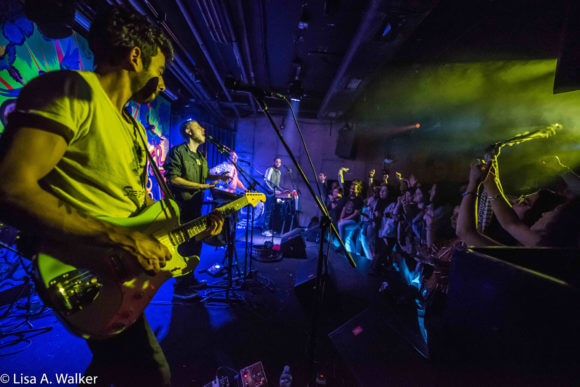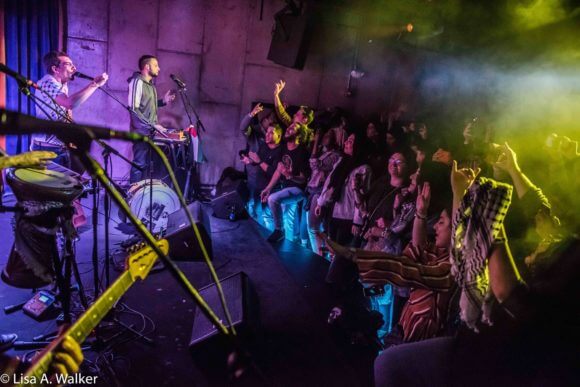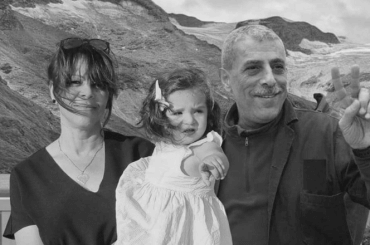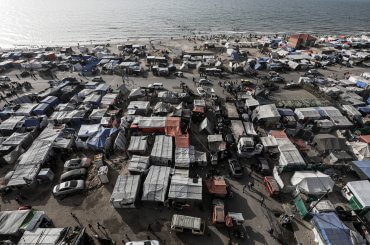It’s a recent Friday night in Washington DC, and the Palestinian electro–debke band 47Soul is playing a sold-out club show at the Tropicalia. As the musicians take to the stage, belting out a pulsing, testosterone-filled rendition of the latest single, “Mo Light,” the atmosphere is lit.
Shamstep is the name that the group has coined for their #NoBorders genre, but the term only partially conveys the muscular vocal range and psychedelic mijwizardry of a sound that fuses elements of electronic dance, trance, reggae, and rock—with some hip-hop bravado thrown into the mix. Beneath the many layers, it’s the Palestinian percussion and the mijwiz—a traditional Arab reed instrument—driving the vibe.
“That sound deserves to be international,” guitarist and vocalist Hamza Arnaout tells Mondoweiss after the show. “I want it to be part of our music. Maybe later on it will contribute to the bigger pool of consciousness in pop music.”
Considering the surge in 47Soul’s global popularity, this idea doesn’t seem far-fetched. The “Intro to Shamstep” video alone has garnered over 8.6 million views; “Mo Light” and “Qamar” have more than a million hits each. The band toured internationally in 2018, and racked up yet another success: “Mo Light” recently landed on NPR’s best music of 2018.
Based currently in the UK, the group got their start in 2013 in Jordan when they began casually collaborating on tracks. After rehearsing three or four times together, they performed for the first time at a club called the Blue Fig in west Amman.
“The way that people interacted with our first and second show, live—that made the band,” vocalist and percussionist Tareq Abu-Kwaik says. “Everyone danced. The valet guys, the bartenders, the waiters, the people in the club, everyone was dancing.”
A similar enthusiasm is palpable in the air at the Tropicalia, as the musicians move from “Don’t Care Where You From” to “Moved Around” to an extended, improvisational version of “Everyland.”
DC native Ramzy Suleiman is killing it on keyboards. Front man Walaa Sbait goes into full Palestinian wedding mode, hyping the crowd as if at a shaving party in his native Haifa.
“Ya hallah, mit halla!” he cries—a familiar joyful greeting—as Suleiman’s iconic Palestinian mijwiz melodies blend with reggae beats. Energized fans twirl kuffiyehs and prayer beads overhead, busting out some of their own debke moves.
It’s a fun show, but there is a political message too.
“This is anti-Apartheid music!” Sbait cries out to the cheering, ululating fans throughout the set. “Freedom for all! From DC to Haifa to Jenin to Jerusalem!”
Suleiman gives a heartfelt solidarity shout-out on behalf of “all the black and brown brothers being locked up for petty crimes…in the belly of the belly of the belly of the belly of the beast.”
These moments feel organic to the ethos of a group that weaves messages of freedom and unity into all aspects of their work. The band’s joy in transmitting Palestinian cultural tradition does not preclude a commitment to a secular, transnational, humanist vision.
“Every land is a holy land, every land,” they sing in unison with conviction. “Every people are a promised people.”
Lyrics like these that embrace notions of radical democracy could easily be interpreted as a tacit endorsement of a one-state political position. But members of 47Soul insist that they don’t want to be pigeon-holed or misconstrued as the “poster boys” for any ideological viewpoint.
“Even the word political is tricky,” Tareq Abu-Kwaik says. “I don’t call it political. What we do is just a normal reflection of reality. It’s social. It’s human.”
Whether their work is defined as political or not, the band isn’t shy about speaking out about injustice. “I can’t keep going with ignoring my people,” Abu Kwaik says. “I have to write about my people.”

In keeping with a tradition of socially-engaged art, 47Soul’s lively protest songs take aim not just at external forces of oppression, but at internal social contradictions as well. The lyrics of “Mo light,” “We’re good, we’re good we alright, they’ve seen us alive. We’re good we’re good. We just need more light,” suggests a desire to challenge repressive, “dark-age” social conditions.
In particular, many of the songs are concerned with freedom of movement, which is only natural for an ensemble of diasporic artists who face extremely complex travel and visa restrictions. Though all of the members of the group are Palestinians, Tareq Abu-Kwaik and Hamza Arnaout, the children of refugees, have Jordanian passports; Ramzy Suleiman is a U.S. citizen; and Walaa Sbait, whose family hails from the ethnically cleansed village of Iqrit—is a Palestinian citizen of Israel. This adds another layer of complexity, since he can’t travel freely throughout much of the Arab world.
Even the name of the band is a reference to a yearning to roam in a borderless world. Abu-Kwaik explains that 47Soul is actually an allusion to the year when it was still possible to travel freely from Damascus to Jerusalem to Amman. “So it’s a symbol of freedom of movement. But the Occupation of Palestine ended that.”
After 70 years, the Nakba and its aftermath still affect them. “I would love to live somewhere like Haifa,” Arnaout confides. “That is where I would like to own a house, near the beach. And I don’t want to do that in Portugal. I want to do that in Palestine.”
In many ways, 47Soul provides a voice (albeit an all-male voice) for a millennial generation of Palestinian youth who search for answers to questions of history, place, and identity. These artists choose to answer such questions through their internationalist sound.
Instead of simply mourning the tragic consequences of displacement, they transform the Palestinian knack for survival, resistance, and mobility into cause for celebration and dance.
“My people move around,” the young musicians sing in “Moved Around.” “Now people move around. All people move around. Yalla yalla yalla, move around!”
And the fans in the Tropicalia do just that. A line of mostly Arab-American men and women join hands in a spontaneous debke line, happily snaking through the crowd.
47Soul is also on the move. They are determined to stay together and keep making music. Right now, they are back in the UK, collaborating on new material. They hope to be able to release a third album by next year.
Writing music is an enjoyable process, but also a challenge. “It’s about as fun as pregnancy could be,” Arnaout laughs, “It’s like the best thing that could happen to you, but also the hardest thing.”
Hopefully it will be a very prolific year for 47Soul. Meanwhile they have some good news for American fans. They will be back touring in the U.S. this March.
Catch them if you can.



i totally love 47Soul and wonder if they are coming to the bay area. i hope so! i’ve watched many clips from their live performances in youtube over the years (as well as all their other videos) and they’re totally extraordinarily awesome! thanks for writing this fabulous review.
we’re good we’re good we’re alright they’ve seen us alive
we’re good we’re good we just need more light
https://www.youtube.com/watch?v=90ofPQuvrZU